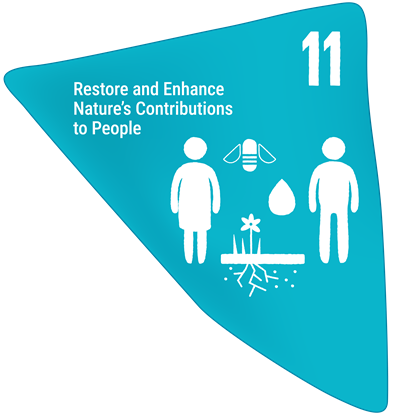 Unsplash- Joshua Hoehne
Unsplash- Joshua Hoehne
International Day of Awareness of Food Loss and Waste -- 29 September 2024
The world produces enough food to feed everyone on the planet, but 757 million people remain food insecure and over 2.83 billion are unable to afford a healthy diet.
Notwithstanding the well-known facts, tons of food continue to be produced only to rot away in landfills, while millions go hungry.
Food production and, more broadly, agriculture remain among the main drivers of global biodiversity loss. Meanwhile, food waste is burning through the world’s emissions budget: it is the source of between 8 and 10 per cent of global greenhouse gas emissions.
In a world grappling with the intertwined crises of climate change, biodiversity loss and pollution, food loss and waste constitute a dangerous extravagance that neither people nor nature can afford.
The world must take urgent action.
The Kunming-Montreal Global Biodiversity Framework (KMGBF), the world’s masterplan to halt and reverse biodiversity loss adopted under the Convention on Biological Diversity (CBD), provides pathways:
- To sustainable agricultural production through Target 10.
- To the enhancement of nature’s contributions to people through Target 11.
- And to reducing waste and overconsumption, including through halving global food waste by 2030 through Target 16.
These action targets of the KMGBF and others—23 in total—must be achieved by 2030.
At COP 16 of the CBD, which will take place from 21 October – 1 November in Cali, Colombia, Parties will consider an Action Plan on the interlinkages between biodiversity and health. The Action Plan addresses the impacts of waste and overconsumption on health and biodiversity.
In the lead-up to COP 16, Parties are aligning their National Biodiversity Strategies and Action Plans (NBSAPs) with the KMGBF. At the national level, the synergetic implementation of all Multilateral Environmental Agreements, including the UN Framework Convention on Climate Change (UNFCCC) and the UN Convention to Combat Desertification (UNCCD) can drive progress on curbing food loss and waste.
For instance, Nationally Determined Contributions (NDCs) and National Biodiversity Strategies and Action Plans (NBSAPs) should encompass efforts related to ending food loss and waste as one of the drivers of the environmental poly-crisis afflicting the planet.
We know that progress is possible, and that nature-based solutions and technology are on our side. Countries such as Japan and the United Kingdom have achieved substantial reductions in food waste: 31 per cent and 18 per cent, respectively.
We expect G20 countries to take a leading role in international cooperation and policy development to accelerate the implementation of SDG 12 on Responsible Consumption and Production and the achievement of the relevant action targets of the KMGBF.
As is the case with all the 23 actions targets of the KMGBF and the 17 overarching SDGs, a whole-of-government and a whole-of-society approach is needed.
Sustainable consumption and production patterns constitute a cornerstone of a future where humanity lives in harmony with nature.
Food loss and waste have no place in that future.
More information:
The Kunming-Montreal Global Biodiversity Framework
Related Targets in The Kunming-Montreal Global Biodiversity Framework
Ensure that areas under agriculture, aquaculture, fisheries and forestry are managed sustainably, in particular through the sustainable use of biodiversity, including through a substantial increase of the application of biodiversity friendly practices, such as sustainable intensification, agroecological and other innovative approaches contributing to the resilience and long-term efficiency and productivity of these production systems and to food security, conserving and restoring biodiversity and maintaining nature’s contributions to people, including ecosystem functions and services.
Why is this target important?
Agriculture, aquaculture, fisheries and forestry are globally important production systems that have varying impacts on ecosystems and biodiversity. The variety and variability of animals, plants and microorganisms used in these systems is an important aspect of biodiversity. Further, in many countries, activities associated with these production systems are important elements of human well-being and economic activity. However, the increasing demand for food, fibre and fuel is leading to increasing losses of biodiversity and ecosystem services, making sustainable management in these systems an urgent requirement. On the other hand, sustainable management not only contributes to biodiversity conservation but can also deliver benefits to production systems in terms of ecosystem services such as soil fertility, erosion control, enhanced pollination and reduced pest outbreaks, as well as contributing to the well-being and sustainable livelihoods of people engaged in agriculture, aquaculture, fisheries and forestry activities.
Links to other elements of the Biodiversity Plan and other frameworks and processes.
- Actions to reach Target 10 should take into account all of the considerations for the implementation identified in section C of the Kunming-Montreal Global Biodiversity Framework.
- This target will contribute to the attainment of goals A and B of the Kunming-Montreal Global Biodiversity Framework. Further progress towards this target will facilitate the attainment of targets 2, 4, 6, 7, 8, 9, 11 and 16. Conversely, the attainment of this target will be facilitated by actions to reach targets 1, 14, 17, 19, 20, 21, 22 and 23.
- Target 10 addresses issues previously covered by Aichi Biodiversity targets 6 and 7
- Elements of Target 10 are also addressed in the targets of the Sustainable Development Goals, including targets 2.3, 2.4, 12.1, 12.2, 14.7 and 15.2.

Restore, maintain and enhance nature’s contributions to people, including ecosystem functions and services, such as regulation of air, water, and climate, soil health, pollination and reduction of disease risk, as well as protection from natural hazards and disasters, through nature-based solutions and/or ecosystem-based approaches for the benefit of all people and nature.
Why is this target important?
Nature’s contributions to people, a concept similar to and inclusive of ecosystem services, refers to all the contributions from biodiversity to people’s well-being or quality of life. These contributions take various forms, including material contributions, regulating services and other non-material contributions including spiritually and culturally. As a result of the ongoing decline of biodiversity, nature’s contributions to people are also in decline, with serious implications for human well-being and social cohesion. The restoration, maintenance and enhancement of nature’s contributions to people provides an important rational for the conservation and sustainable use of biodiversity.
Links to other elements of the Biodiversity Plan and other frameworks and processes.
- ns to reach Target 11 should take into account all of the considerations for implementation identified in section C of the Kunming-Montreal Global Biodiversity Framework.
- Progress towards this target will support the attainment of goals A and B of the Kunming-Montreal Global Biodiversity Framework. Progress towards this target will be facilitated through the actions taken to reach the other targets of the Global Biodiversity Framework, in particular those targets addressing the direct drivers of biodiversity, namely targets help to reach targets 2, 3, 5, 6, 7, 8, 9, 10 and 12.
- Elements of Target 11 were previously addressed under Aichi Biodiversity Target 14.
- Elements of Target 11 are also addressed in the targets of the Sustainable Development Goals, including targets 1.5 and 15.4

Ensure that people are encouraged and enabled to make sustainable consumption choices including by establishing supportive policy, legislative or regulatory frameworks, improving education and access to relevant and accurate information and alternatives, and by 2030, reduce the global footprint of consumption in an equitable manner, including through halving global food waste, significantly reducing overconsumption and substantially reducing waste generation, in order for all people to live well in harmony with Mother Earth.
Why is this target important?
Unsustainable consumption is an underlying driver of biodiversity loss. Halting and ultimately reversing biodiversity loss will require a shift towards more sustainable consumption patterns. This means consuming resources and producing waste at a level within planetary boundaries. Governments have a central role to play in making information available and accessible to consumers who, in turn, can make better and more informed consumption choices.
Links to other elements of the Biodiversity Plan and other frameworks and processes.
- Actions to reach Target 16 should take into account all of the considerations for implementation identified in section C of the Kunming-Montreal Global Biodiversity Framework.
- Progress towards this target will help to reach goals A and B of the Kunming-Montreal Global Biodiversity Framework. Progress towards this target will also help to reach targets 4, 5, 6, 7, 8, 9, 10 and 11. Conversely progress towards targets 14, 15, 18, 19, 20, 21, 22 and 23 will facilitate progress towards this target.
- Elements of this target were previously addressed in Aichi Biodiversity targets 1 and 4
- Elements of Target 16 are also addressed in the targets of the Sustainable Development Goals, including targets 4.7, 8.4, 9.4, 12.1, 12.2, 12.3, 12.5, 12.8 and 12.a
- Elements of this target are addressed in UNEA resolution 5/14 to develop an international legally binding instrument on plastic pollution
- Target 16 also links to processes under the 10-Year Framework of Programmes on Sustainable Consumption and Production, a global commitment by the 193 United Nations Member states to accelerate a shift to sustainable consumption and production.
